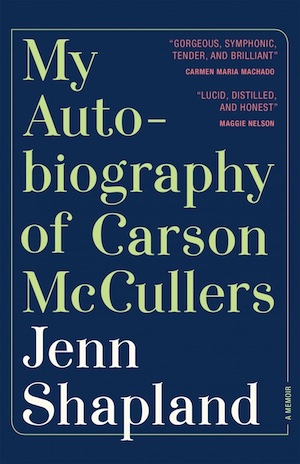Winner of the 2021 Christian Gauss Award
By David Madden
On the wall of my study you may see a photograph of Carson McCullers and Tennessee Williams that I cut out of a magazine when I was 14 in 1949. It is only one of many types of associations I have had with them over the years, making me very receptive to Jenn Shapland’s innovative first book, My Autobiography of Carson McCullers.
In recent years, biographers insinuate themselves into their books. Virginia Spencer Carr, the author of the first major biography of Carson McCullers, involves herself indirectly in her biography of Paul Bowles. Shapland takes a giant step further by making herself the primary personage in her narrative of her agonized journey in search of the origins of Carson McCullers’ sexuality.
Shapland focuses on the nature and problems of lesbians and the many indications that that was McCullers’ identity, but the story may inspire a discovery or rediscovery of the novels, plays, and memoirs of Carson McCullers, which are now too little known.
I modeled the heroine of my first novel, Cassandra Singing, partly on the strange character of Mick Kelly in McCullers’ first novel, The Heart Is a Lonely Hunter. I got to know her by asking permission to submit my adaptation of that novel to a play producer. Her second novel was the bizarre Reflections in a Golden Eye, set on an army base. Her illnesses and her marital problems delayed completion of her third novel, The Member of the Wedding. Decades later, I asked Tennessee Williams, by then an acquaintance of mine, for permission to quote from Summer and Smoke in a play I was writing about the time he helped McCullers shape her play adaptation of The Member of the Wedding. “Only,” he replied, “if I write it with you.” He died accidentally a few weeks later.
Readers may discover that The Ballad of the Sad Café and Other Stories, Clock Without Hands, the play The Square Root of Wonderful, and The Mortgaged Heart are not as impressive, but that, taken all together, Carson McCullers is certainly a major writer.
Shapland herself has made a major contribution to the genre of autobiography by adeptly meshing on every page her own struggle with illness and the agonies of sexual identity with McCullers’.
To keep the reader’s attention fixed upon the parallels, she consistently employs the device of juxtaposition:
The woman the world wanted [Carson] to be—with dainty features and demure affects—was deeply at odds with the woman she was.
I felt this when I was young, too, an unfittingness.
Like the leaping and backward weaving of memory, Shapland’s method is non-chronological. Fascinating to follow are her research at Ransom Library in Austin, Texas; her intriguing stay as writer in residence in the house that was McCullers’ home in Columbus, Georgia, during childhood and often in adulthood; communing with her clothes and other artifacts; and her time working on the autobiography at Yaddo writers’ retreat, where McCullers had often worked on her fiction.
Shapland’s life and loves are also part of her narrative, inviting comparisons to McCullers’ life—her marriage to a bisexual man, her supposedly women lovers (especially her therapist), and her encounters with other artists, playwrights, poets, and novelists: Tennessee Williams, W. H. Auden, Marilyn Monroe, Isak Dinesen, Edith Sitwell, Katherine Anne Porter, Gypsy Rose Lee, Edward Albee, Richard Wright, Patricia Highsmith, Janet Flanner, Elizabeth Bowen.
The author of The Voice of James M. Cain: An Innovative Biography (2020), David Madden (ΦBK, University of Tennessee) is working on a memoir of his “creative” years in the army and on a memoir of his mother, both employing innovative methods.




